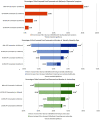Cross-sectional examination of ultra-processed food consumption and adverse mental health symptoms
- PMID: 35899785
- PMCID: PMC9991859
- DOI: 10.1017/S1368980022001586
Cross-sectional examination of ultra-processed food consumption and adverse mental health symptoms
Abstract
Objective: To explore whether individuals who consume higher amounts of ultra-processed food (UPF) have more adverse mental health symptoms.
Design: Using a cross-sectional design, we measured the consumption of UPF as a percentage of total energy intake in kilo-calories using the NOVA food classification system. We explored whether individuals who consume higher amounts of UPF were more likely to report mild depression, more mentally unhealthy days and more anxious days per month using multivariable analyses adjusting for potential confounding variables.
Setting: Representative sample from the United States National Health and Nutrition Examination Survey between 2007 and 2012.
Participants: 10 359 adults aged 18+ without a history of cocaine, methamphetamine or heroin use.
Results: After adjusting for covariates, individuals with the highest level of UPF consumption were significantly more likely to report at least mild depression (OR: 1·81; 95 % CI1·09, 3·02), more mentally unhealthy (risk ratio (RR): 1·22; 95 % CI 1·18, 1·25) and more anxious days per month (RR: 1·19; 95 % CI 1·16, 1·23). They were also significantly less likely to report zero mentally unhealthy (OR: 0·60; 95 % CI 0·41, 0·88) or anxious days (OR: 0·65; 95 % CI 0·47, 0·90).
Conclusions: Individuals reporting higher intakes of UPF were significantly more likely to report mild depression, more mentally unhealthy and more anxious days and less likely to report zero mentally unhealthy or anxious days. These data add important information to a growing body of evidence concerning the potential adverse effects of UPF consumption on mental health.
Keywords: Epidemiology; Mental health; National Health and Nutrition Examination Survey; Ultra-processed foods.
Figures
References
-
- Patel V, Chisholm D, Parikh R et al. (2016) Addressing the burden of mental, neurological, and substance use disorders: key messages from disease control priorities. Lancet 387, 1672–1685. - PubMed
-
- Rehm J & Shield KD (2019) Global burden of disease and the impact of mental and addictive disorders. Curr Psychiatry Rep 21, 10. - PubMed
-
- Rahe C, Unrath M & Berger K (2014) Dietary patterns and the risk of depression in adults: a systematic review of observational studies. Eur J Nutr 53, 997–1013. - PubMed
-
- Lai JS, Hiles S, Bisquera A et al. (2014) A systematic review and meta-analysis of dietary patterns and depression in community-dwelling adults. Am J Clin Nutr 99, 181–197. - PubMed
-
- Li Y, Lv MR, Wei YJ et al. (2017) Dietary patterns and depression risk: a meta-analysis. Psychiatry Res 253, 373–382. - PubMed
Publication types
MeSH terms
Substances
Grants and funding
LinkOut - more resources
Full Text Sources
Medical


